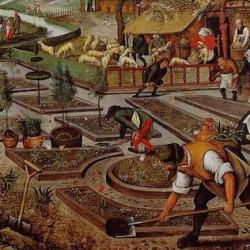Stallybrass and White critize Bakhtin for conceptualizing the fair purely as a place of communal celebration, ignoring the commercial activities of the fair: “In developing this concept, Bakhtin succumbs to that separation of the festive and the commercial which is distinctive of capitalist rationality as it emerged in the Renaissance. As the bourgeoisie laboured to produce the economic as a separate domain, partitioned off from its intimate and manifold interconnectedness with the festive calendar, so they laboured conceptually to re-form the fair as either a rational, commercial, trading event or as a popular pleasure-ground.” In addition to the threat of political subversion arising from fairs, early modern bourgeois, Stallybrass and White clai, “were perhaps more scandalized by the deep conceptual confusion entailed by the fair’s mixing of work and pleasure, trade and play.”
Early modern people had more and more difficulty countenancing this muddle. The fair as popular revelry was low, dirty, subversive; the fair as a commercial site was part of the civilizing process, one of the connecting points between the civilized life of the towns and courts and the still barbarous life of the villages. This “oppositional splitting into incompatibles required much conceptual (and material) labour. The fair as a site of hybridization epistemologically undermined the separation of the economic from ‘play’ and the clean from the dirty.”
They go on to point out that this separation of commerce and play “has to a large extent been unconsciously internalized by modern scholarship in its disciplinary divisions.” Fairs are studied by social historians and cultural theorists as places of revelry and subversion; economists study fairs as commercial sites.










